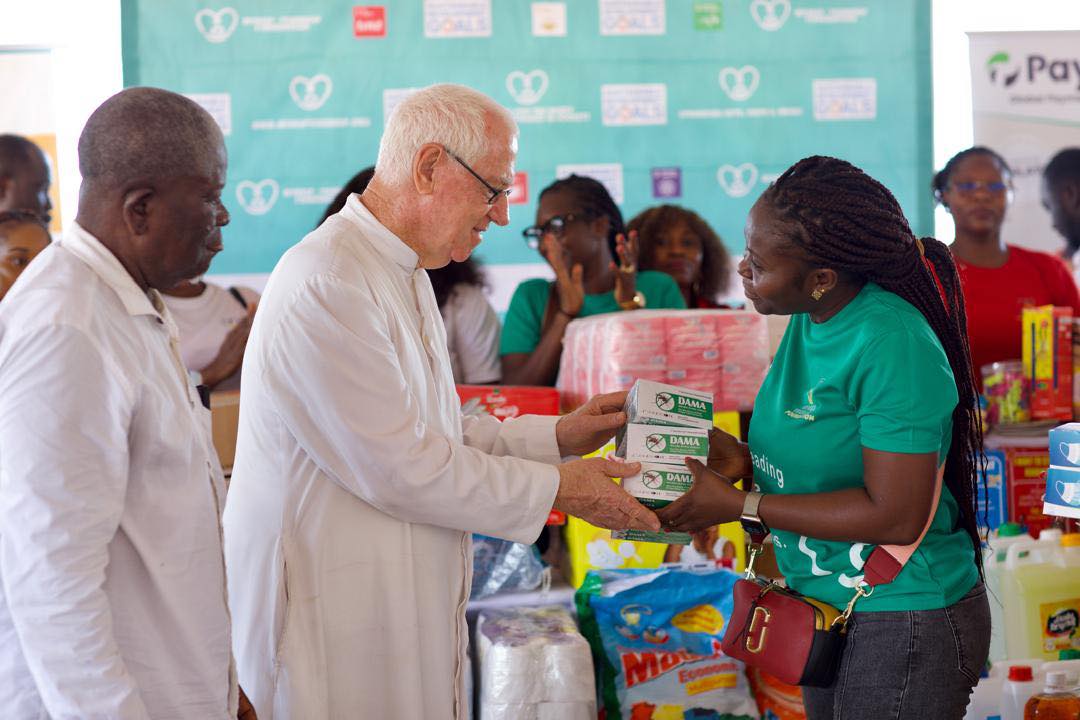In a heartwarming display of compassion and humanity, MyHelp-YourHelp Foundation in partnership with PayAngel brought the spirit of Easter alive at the Weija Leprosarium on Easter Saturday.
Under the theme “Easter Compassion: From Isolation to Inclusion,” the Foundation donated assorted food items, medications, clothing, stationery, and books to stock their library, all to the tune of about GH₵60,000 and a cash amount of GH₵10,000 to support the welfare of cured lepers and underserved children.
The gesture, which deeply moved beneficiaries and onlookers alike, was received with profound gratitude by Rev. Father Andrew Nii Lante Campbell, the long-time champion of the cured leper community. He praised the Foundation for its tangible gifts and willingness to bridge social gaps and affirm the dignity of people affected by leprosy.
Historically, leprosy—now more commonly referred to as Hansen’s disease—has been associated with severe social stigma. The Greek origin of the word “leprosy” means “scales,” a reference to one of its visible symptoms. Despite advancements in treatment, the stigma remains a significant barrier to early diagnosis and inclusion. This is what makes initiatives like MyHelp-YourHelp Foundation so crucial.
The Easter visit was about more than donations; it was about breaking barriers. The usually quiet Leprosarium was transformed into a vibrant compound filled with joy. Members of the Foundation sat, dined, laughed, and shared stories with the cured lepers, many of whom had lived lives of exclusion. For them, the day marked a shift: from isolation to inclusion, from being forgotten to being embraced.
The children who had been picked from the streets of nearby underserved communities and housed in the Leprosarium were also part of the celebration. They participated in fun and engaging activities like Bible quizzes, musical chairs, and dance competitions. Their joy was palpable. “This is the happiest day of my life!” one young boy exclaimed, his face lit up with a smile.
Leprosy continues to affect millions globally. According to recent data, an estimated two to three million people live with disabilities caused by the disease.
With the recent World Leprosy Day observed on January 26, 2025, under the theme “Unite. Act. Eliminate.,” the Foundation’s visit serves as a reminder of the need for sustained advocacy, support, and action.
“Let this not be a one-time visit,” one resident of the Leprosarium pleaded. “Come again. You have made us feel seen.”
For the MyHelp-YourHelp Foundation, the day marked yet another fulfilled mission in their long-standing journey of compassion. By bringing Easter compassion to life, they reaffirmed a powerful message: inclusion is not charity; it is humanity.
Through acts of generosity, empathy, and presence, the Foundation proved that no one should ever be left behind. Not during Easter. Not ever.
Mr. Delali Kotoka, the Manager of PayAngel, in an interview, emphasized the need for social inclusion. He encouraged other organisations to emulate their gesture to partner with the MyHelp-YourHelp foundation to increase their reach.
In his closing remarks, Mr. Nicholas Cofie, President of the MyHelp-YourHelp Foundation, appealed to corporate organizations, philanthropists, and benevolent groups to partner with the foundation in executing more impactful projects. He emphasized the foundation’s strong track record and credibility as a trusted vehicle for meaningful social change.
MyHelp-YourHelp Foundation is driven by a committed network of working-class professionals—including doctors, nurses, lecturers, security personnel, engineers, bankers, entrepreneurs, lawyers, and others—who have united with a shared mission: to pool their resources and make a lasting, positive impact in society.
Their work supports several United Nations Sustainable Development Goals (SDGs), particularly those focused on poverty reduction, good health and wellbeing, and quality education. Since its establishment in 2018, the foundation has successfully undertaken 23 major projects, all designed to uplift the poor, the vulnerable, and the marginalized.

